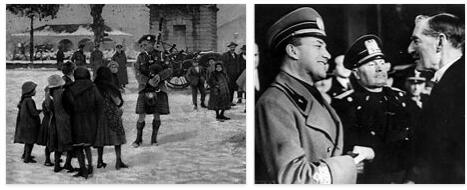Italy Foreign Policy of the First Year of the War
Italy’s entry into the war alongside Germany had taken place without any preventive political-military coordination, which never really took place even afterwards. The frequent meetings between Mussolini and Hitler (Brenner, 4 October 1940; Florence, 28 October 1940; Salzburg, 20 January 1941; Brenner, 2 June 1941, etc.), interspersed and flanked by those of Ciano with Ribbentrop and Hitler, (and of Mussolini with Ribbentrop), remained vague and inconclusive, resulting in long monologues by the Führer. Indeed, Mussolini ended up feeling like a servant “who is called by the bell”.
There were two theaters of war: Germanic in the north (against England, and then on two fronts, English and Russian), and Italian in the south, with auxiliary intervention in each of the two sectors of the other ally. This intervention, however, was extremely uneven between the two parties. On the part of Italy, against England, it was reduced to sending some squadrons for air action on the island, and this participation lasted just over a couple of months (from the second half of October to the end of December 1940). There was also collaboration of Italian submarines with the Germans in the naval war against the Anglo-Saxons. Much more important was the concurrence of the Italian troops in Russia, with an army; however they remained completely in the suborder.
Politically, the starting positions of the war in common were different, since Italy had yet to begin the realization of its objectives, and had scarce forces for this purpose, while Hitler was already found to have achieved a large part and to have an enormous victorious and fully efficient armed force. Hitler now aspired to peace; and he hastened to accept Petain’s request for an armistice, made just a week after Italy entered the war. As a first act of war, therefore, Mussolini had to rush to Munich (June 18, 1940) to the Führer, to discuss the armistice conditions with him. However, he wanted to carry out a war action, and imposed on the reluctant chief of staff Badoglio the attack on the Alpine front. In the three days of combat (June 22-24) it made very little progress. On the 25th, the armistice signed the evening before in Rome entered into force: it granted Italy a narrow strip of French metropolitan territory (it did not even reach Nice). Mussolini’s primitive project would have been the occupation of all the coveted territories, and even the delivery of the French fleet; but in the face of the actual situation, and of the German orientation aimed at sparing France, he certainly gave up. occupation of all the coveted territories, and even the surrender of the French fleet; but in the face of the actual situation, and of the German orientation aimed at sparing France, he certainly gave up. occupation of all the coveted territories, and even the surrender of the French fleet; but in the face of the actual situation, and of the German orientation aimed at sparing France, he certainly gave up.
Instead, Hitler’s (July 19) peace offer to England fell on deaf ears. Thus remained the Mediterranean and colonial war against England, which was waged with great commitment and, at first, with some success, both in East Africa (occupation of British Somalia), and in Libya with the September offensive against Britain. Egypt, which reached Sidi el-Barrani. The offensive was imposed by Mussolini on Marshal Graziani, who did not think he had sufficient strength. Mussolini was thinking of an occupation in Cairo, which he said was more important than London. However, he never succeeded (nor, it would seem, never really tried) to persuade Hitler of the primary importance of the Mediterranean sector.
From the earliest days of his entry into the war, Mussolini had thought of great initiatives of his own, against Yugoslavia (which he wanted to demolish as Hitler had demolished Czechoslovakia) and against Greece – to which he held a grudge for the distant episode of Corfu, which he intended annex. But his plans were rejected by Hitler. After the latter, in early October 1940, had taken possession of Romania, Mussolini – continuing in the system inaugurated with the Albanian occupation of April 1939 – launched (28 October) an ultimatum to Greece, accused of tolerance towards the English Mediterranean forces and, at the same time, he unleashed the attack from Albania. The outcome was disastrous: the Greeks drove back the invaders, who were clearly inadequate in strength (it was believed an internal collapse of Greece), and they entered Albania. The campaign went on, unfavorable for Italy and exhausting, despite the fact that the Duce, on November 18, had said: “we will break Greece’s backs”, and on February 23, 1941 he announced: “soon the best will come”. Instead, at a certain point Mussolini even thought of asking for a truce. Added to this was the reversal of the situation in Africa, following the British counter-offensive that began in December 1940, which brought the British beyond Benghazi, and the British invasion of Ethiopia. Added to this was the naval disaster of Taranto (November 1940), caused by the British air force, which departed from the new Greek bases, while the navy transporting Libya was worn down by the English attacks. Since then a crisis has arisen in the government apparatus,
A month before the start of the action against Greece, the so-called Tripartite, that is the alliance between Germany, Italy and Japan, had been signed in Berlin, on 27 September 1940, already planned two years earlier. The Axis powers and Japan recognized each other as the top international leadership in Europe and “Greater East Asia” (not otherwise specified). Mutual assistance was also promised in the event of an attack by one of them by a power not engaged in the European war or the Sino-Japanese conflict. Since it was added that the pact did not imply any modification of political status with Russia, it came to be directed against the United States; thus increased the
The policy of the Axis now turned to obtain the greatest number of European adhesions to the Tripartite. Between 20 and 24 November there were those of Hungary, Romania, Slovakia. More important would have been the accession of Spain; on the contrary, Franco was expected to enter the field alongside the Axis, which would have made the attack on Gibraltar possible. But Franco dodged, then and then, such a decision, despite the fact that Mussolini worked with him in this sense, particularly at the Bordighera conference in February 1941.
In March 1941 Bulgaria and Yugoslavia joined the tripartite. Except that in the second the accession immediately followed a military coup in favor of the minor Peter II, who ousted the regent Prince Paul (March 27) and concluded a non-aggression pact with the USSR (April 5). On April 6, 1941, Germany and Italy declared war on Yugoslavia, which in a few days was prostrated, occupied and divided. Slovenia was divided between a minor part annexed to the Reich (which this was taken without question) and a major part to Italy, with great autonomy. Croatia constituted, under the dictator A. Pavelič, a monarchy, whose crown was offered to the Duke of Spoleto (later of Aosta) Aimone, who nevertheless never actually ascended the throne. Banat returned to Hungary; Serbia and Bosnia formed a small state, controlled by the Germans; Montenegro claimed its state autonomy, under the control of Italy, without finding a Petrovič who wanted to take over the crown. A large part of Dalmatia was annexed to Italy, tearing that region apart in the most arbitrary way. Soon a multiple guerrilla warfare, of Croats and Serbs among them, of Yugoslavs against Germans and occupying Italians, flared up in the country, filling it with unspeakable horrors. Thus Mussolini precipitated with respect to Yugoslavia in an imperialist nationalism, tearing up that treaty of Rapallo which had nevertheless been one of the most beautiful achievements of Italian diplomacy. A large part of Dalmatia was annexed to Italy, tearing that region apart in the most arbitrary way. Soon a multiple guerrilla warfare, of Croats and Serbs among them, of Yugoslavs against Germans and occupying Italians, flared up in the country, filling it with unspeakable horrors. Thus Mussolini precipitated with respect to Yugoslavia in an imperialist nationalism, tearing up that treaty of Rapallo which had nevertheless been one of the most beautiful achievements of Italian diplomacy. A large part of Dalmatia was annexed to Italy, tearing that region apart in the most arbitrary way. Soon a multiple guerrilla warfare, of Croats and Serbs among them, of Yugoslavs against Germans and occupying Italians, flared up in the country, filling it with unspeakable horrors. Thus Mussolini precipitated with respect to Yugoslavia in an imperialist nationalism, tearing up that treaty of Rapallo which had nevertheless been one of the most beautiful achievements of Italian diplomacy.
The Germanic advance on the body of Yugoslavia, assisted by the Bulgarian intervention, led to the capitulation of the Hellenic army in the hands of the Germans, to Mussolini’s spite. All of Greece, continental and insular, was occupied by the Axis; a few English relief troops retreated rapidly until re-boarding. From the mountains of Bohemia to Cape Matapan, the Axis was the master of all Danubian-Balkan Europe: in fact, however, the mistress was Germany, which dominated and intrigued even in the areas formally recognized as the Italian “living space”. Mussolini considered himself powerless in the face of German dominance and aspirations, which he believed could reach as far as Trieste and Verona.



